Northern and arctic societies. Рубрика в журнале - Arctic and North
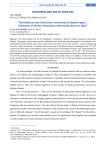
Статья научная
The article details the list of “Samoyeds”, compiled in 1832 by Tobolsk missionary Hieromonk Makarii. The generic names and surnames indicated there show that they belonged to the European, Ural and Siberian tundra Nenets, and it was not by chance that they were on the same list. It was a small group from the “Vojkar Samoyeds”, a separate territorial group of the Nenets ethnos, wandering in the 17th–19th centuries on both sides of the Subpolar Urals. On the basis of information from the “List”, generalization of materials from archival documents and works of researchers and travelers of the 18th – 19th centuries, it was possible to put forward several reasonable assumptions and clarifications about the origin of some Nenets families and patronyms, places of their settlement and marital relations. In addition, for the first time, it was possible to find information about the compiler of the “List”, its life and activities long before the missionary trip to the north of the Berezovsky department.
Бесплатно
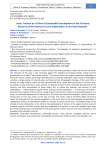
Статья научная
In recent decades, interest in Arctic tourism has been growing at a high rate all over the world. The relevance of this area is also increasing against the background of global climate change and the development of so-called “last chance tourism”. The Russian Arctic has unique competitive advantages in the Arctic tourism market, preserving vulnerable Arctic and tundra landscapes under various anthropogenic activities, a large number of national parks and historical and ethnographic heritage. At the same time, a number of single-industry towns are also concentrated there, which have practically no revenue base. According to many researchers, Arctic tourism can become a driver for the sustainable development of the territory and local communities of these towns. But to realize this scenario, the interest of local stakeholders — representatives of government, business and the population — is necessary. This article is devoted to the analysis of the results of a study of local communities’ interest in tourism development as a driver of sustainable development of the territory. The Arctic zone of the Komi Republic, namely the former mining town of Inta, was chosen as the area of study. The results of desk and field studies carried out within the framework of the research expedition in the Arctic zone of the Komi Republic are described. A comparative analysis of international studies on the topic has been carried out, a conceptual model of the attitude of local communities in the Arctic to the development of tourism in the region and the results of in-depth research and focus groups with key stakeholders of tourism in the Komi Republic have been described, limiting factors and potential for the development of Arctic tourism have been identified on the example of the selected territories.
Бесплатно
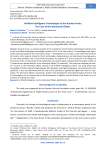
Artificial Intelligence Technologies in the Russian Arctic: The Case of the Murmansk Oblast
Статья научная
Russian Arctic is a positive example of the introduction of information technologies (Industry 4.0.) as well as artificial intelligence technologies (Industry 5.0.). In the 21st century, IT-technologies have significantly improved quality of life in the Russian Arctic — development of IT camps, access to the Internet from the tundra. Arctic projects related to the AI technologies implementation are becoming increasingly popular: the article provides a list of such Arctic AI projects. An analysis of IT and AI vacancies in all subjects of the Russian Arctic on the website of the headhunter recruitment agency showed that the largest number of IT vacancies was posted directly in the Murmansk Oblast (74 vacancies). The study also analyzed job seekers’ resumes in the Murmansk Oblast, posted in the Artificial Intelligence section. The study shows that knowledge of Python programming language, SQL databases and English language is a prerequisite for all AI specialists. It was also determined that the salary of AI specialists is significantly higher than that of IT specialists. The Murmansk Oblast is becoming a leader in the development and implementation of both IT and AI technologies; this is primarily due to the development of logistics and the Northern Sea Route as an alternative to existing sea routes.
Бесплатно
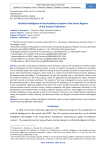
Artificial Intelligence in the Healthcare System of the Arctic Regions of the Russian Federation
Статья научная
Currently, in the Russian Federation, much attention is paid to the introduction of artificial intelligence technologies into the healthcare system in order to improve the quality of medical care provided. The AI methods support the medical decision-making; it becomes possible to obtain a second opinion for a doctor when determining a diagnosis, which leads to a reduced risk of determining erroneous diagnoses (including missed pathologies). The development of high-tech medical care is a particularly relevant issue for medical institutions in the Arctic regions, which are geographically distributed and remote territories with hard natural and climatic conditions. The solution of this issue is designed to ensure natural sustainable population growth in these regions and increase the life expectancy of the population of the Russian Arctic, including the indigenous peoples of the North. The article considers the positive experience of cooperation between Russian research centers, medical companies and higher educational institutions in the development and implementation of medical software products based on technologies and methods of artificial intelligence on the example of such Arctic territories of Russia as the Yamalo-Nenets Autonomous Okrug, the Republic of Sakha (Yakutia), the Murmansk Oblast, the Republic of Karelia and the Arkhangelsk Oblast.
Бесплатно
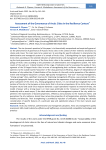
Assessment of the Governance of Arctic Cities in the Resilience Context
Статья научная
The aim (research question) of the paper is to theoretically comprehend and empirically generalize the phenomenon of governance of Russia's Arctic cities in the context of their resilience (resistance to shocks and crises). The main tasks to be solved are: 1) searching for specific indicators to characterize the administrative and managerial system of a sample of Arctic cities; 2) distinguishing the types (groups) of Arctic cities according to the selected indicators of administrative and management system; 3) characterizing the local government structure of the three Arctic cities in the context of the previously conducted typology of Arctic cities according to the parameters of administrative and management system. The main results of the work are: 1) determination of the range of indicators (six) for assessing the quality of management of the 29 largest Arctic cities in terms of strengthening their resilience: these are indicators of openness to the outside world (“basicness” of the city); governance efficiency, degree of independence of decisions of city authorities; 2) identification of five clusters of cities with similar properties of the administrative and managerial subsystem: compact high-quality management, “low-cost” municipal management, “strong average” cities, significant reserves for improving management efficiency, case-anomaly; 3) institutional and geographic factors, acting together, determine the appearance of the administrative and managerial subsystem of the Arctic city. Among geographical factors, it is not latitude but longitude that is the location of the city in the European or Asian Arctic that is of primary importance; 4) For Arctic cities, where frequent natural and social force majeure demands a super-operational response to external threats, the model of power with a strong mayor is in most cases preferable to the “consensus” model of collective leadership with a weak mayor; 5) the ideal administrative and management system of the city, which implements the imperatives of basicness/openness, efficiency and autonomy to the maximum extent, and guarantees the city resilience, should have nature-like properties of self-organization, plasticity, flexibility, mobility and diversity. Their strengthening is provided by rejection of unification, including the ultimate consideration of specific features of a particular type and exploitation phase of the main natural asset nearest to the city.
Бесплатно
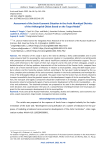
Статья научная
The relevance of this study is due to the need to develop a fairly understandable and in some sense universal tool for assessing the socio-economic situation in municipalities (districts and settlements) with pronounced territorial specifics, with clearly insufficient statistical and information support. The authors, with references to the results of their own research and to the work of their colleagues, present a detailed analysis of the key problems characteristic of the territories of the Russian Arctic, compare them with a set of main external factors of influence in relation to municipalities. Using the SEER expert procedure scheme and the hierarchy analysis method, according to the two-level model proposed by the authors, complex point estimates of the socio-economic situation in the Arctic settlements and municipal districts of the Arkhangelsk Oblast are calculated. The paper notes that the factors that are directly related to transport accessibility have the greatest impact on the development targets of Arctic municipalities. Therefore, the transport and logistics component should be fundamental in all strategic, program and planning documents aimed at achieving the goals of socio-economic development of the Arctic municipalities — districts and settlements. The obtained estimates are proposed to be used in the development of management decisions that could become the basis of a comprehensive interdepartmental inter-municipal program for the socio-economic development of Arctic municipalities.
Бесплатно
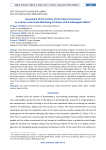
Статья научная
Since 2016, Russia has been implementing the priority federal program “Formation of a Comfortable Urban Environment”. During this period, significant funds have been spent and hundreds of improvement projects implemented in the urban environment in both large and small cities across the country. How did these improvements affect the subjective assessment of the urban environment among citizens? Are the residents involved in the development of these projects, or are they indifferent to these topics? Is there a difference in assessing the quality of the urban environment by the citizens between small and medium cities, company towns and multifunctional metropolitan areas? The article is a partial analysis of a comprehensive study’s data, “The Formation of a Comfortable Urban Environment in the Arkhangelsk Oblast”. The survey was conducted among residents of 5 cities of the Arkhangelsk oblast (n = 793). The methodology for assessing social well-being is used. The cities studied are varied in the typology of size and the dominant form of employment. The results of the study demonstrate the interest of residents in implementation projects. Assessment of the current urban environment is recorded as moderately unsatisfied. Moreover, there is no fundamental difference in assessments of the urban environment’s current conditions in the opinions of residents of small and single-industry towns and citizens of a large, regional center city.
Бесплатно
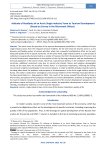
Статья научная
The article raises the question of the tourism development possibilities in the conditions of Arctic single-industry towns from the viewpoint of local residents. On the one hand, the tourism sector is a very dynamic and flexible system of various activities, which has a powerful multiplicative effect on the well-being and quality of life of specific territories. On the other hand, single-industry towns as a special type of settlement are generally characterized by a number of features that limit the development of tourism: lack of social infrastructure, dependence on the position of the city-forming enterprise, and low involvement of the local population in the service sector, which has a special local identity. In the conditions of the Arctic territories, additional restrictions arise due to natural and climatic factors and negative demographic trends. At the same time, the so-called “human factor” is of particular importance, reflecting the willingness of local residents to participate in the tourism industry. In order to identify attitudes towards tourism, including ideas about the problems and prospects of its development in the Arctic single-industry towns of Russia, the authors conducted a sociological survey among residents of the Pechenga municipal district in the Murmansk Oblast (n = 456 people) in 2021. The results of the survey revealed the attitude to living in this territory, perceptions of the prospects and barriers to tourism development, readiness to integrate into the tourism industry. Despite the general positive assessment of the tourism development prospects in single-industry towns and interest in the tourism as a whole, the population demonstrates a rather inert life strategy, including low readiness to receive tourism education.
Бесплатно
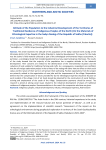
Статья научная
The article examines the attitude of the population of the Sadyn national Evenk nasleg of the Mirninskiy district of the Republic of Sakha (Yakutia) to industrial development. The source for the study was the author’s field material collected as part of the ethnological environmental impact assessment; in particular, a sociological study that included questionnaire survey, expert and group interviews. The results of the study showed that the majority of the population has a negative attitude to the industrial development. Their concerns are related to the deterioration of the environmental situation and the reduction of land suitable for traditional farming and crafts. As a consequence, respondents are confident that the oil and gas exploration project in the territory of the nasleg will either have no effect on their social status and the nature of their work or will worsen their well-being. Positive expectations from the project are primarily related to the organization of new jobs and the improvement of the village. Respondents believe that the compensation of losses provided for by the ethnological expertise should be focused on each resident of the village. First of all, funds should be allocated for the construction of social facilities, training and employment of the youth of the village. Compensation payments should be annual. The research is aimed at solving social issues related to the industrial development of places of traditional residence of indigenous peoples. Recommendations in the search for compromise solutions are given.
Бесплатно
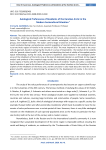
Axiological preferences of residents of the Karelian Arctic in the modern sociocultural situation
Статья научная
The study aims to identify the hierarchy of value dominants in the axiosphere of the Karelian Arctic residents, which has developed under the influence of natural, social, economic, and cultural-historical factors. The methodology used is complex and includes sociological, economic questionnaires, focus groups, and in-depth interviews. The study’s cameral stage is based on an analysis of the empirical stage results conducted during a comprehensive scientific expedition of scientists of Petrozavodsk State University to two Arctic regions of Karelia in the summer of 2019. The most important in the study is the cross-cultural approach, based on comparing the results of a survey of respondents - the Karelian Arctic residents with the “general cultural profile” of S. Schwartz and identifying the level of validity of the applied psychological methodology. During the study, the author’s hypothesis about features in the axiological preferences of the inhabitants of the Arctic zone at the level of dominant indicators is confirmed. At the stage of analysis and synthesis of the empirical stage results, the relationship of preserving human capital in the Arctic regions of Karelia with the identified value dominants of residents’ health and safety is established. Special attention is paid to the influence of the current socio-cultural situation on the formation of the axiosphere of the inhabitants of the Arctic zone, and the conclusion is also made about the need for an integrated scientific approach in determining the prospects for the development of society in the Arctic regions.
Бесплатно
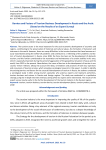
Статья научная
The tourism sector is the most important for the socio-economic development of countries and regions, contributing to the preservation of historical and cultural values, the formation of humanism and tolerance in the world. However, there are many difficulties in the tourism business that have become seriously exacerbated during the COVID-19 pandemic and contribute to a rethinking of the problems and factors of tourism development. In Russia, since 2020, the focus has been on the development of domestic tourism, and this further contributed to the restoration and maintenance of a certain stability in this area, which is especially important during the period of aggravation of the geopolitical situation in Russia and the world, from 2022 to the present. Nevertheless, the issues of barriers to the development of tourism in our country remain relevant, taking into account the ideas, orientations and practices of both tour operators and consumers of tourism services, which actualizes sociological research in this aspect. In order to identify the existing barriers and factors for the successful development of tourism in Russia, the authors conducted a sociological study in 2021 among tourism specialists who acted as experts and represent authorities, tourism business and science in Russian and foreign regions. The study was conducted in a qualitative strategy using the in-depth interview method, during which 31 experts were interviewed. The results of the expert survey may be useful in the further development of the tourism industry in the Russian regions.
Бесплатно
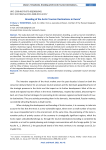
Branding of the arctic tourism destinations in Russia
Статья научная
The study deals with the issues of tourism destinations branding, as well as tourism multidimensionality and tourism destination identity in the Russian Arctic. The factors determining the promotion and branding of tourist destinations in the Russian Arctic are considered in correlation with the fundamental principles of sustainability in Arctic tourism. The relationship between state policy and socio-economic development of the Arctic regions of Russia is considered, in particular, in the aspects of Arctic tourism development. Dialectical, logical, theoretical and empirical methods were conducted for this research. The article defines the conditions for increasing the competitiveness of the domestic tourism product in the Arctic, lists tourism facilities, territories and tourism products that are of the most expressed interest to Russian and foreign tourists. The factors affecting the competitiveness of the tourism product in the Russian Arctic are identified. The article presents the components of the tourist destinations image in the Russian Arctic, which may become the basis for the formation of a strategy for branding tourism in the Arctic regions. The conclusion is drawn about the need for an umbrella brand creation for the Russian Arctic. The necessity of creating conditions for the professional implementation of tourist personnel in the Arctic regions of Russia and the influx of labor resources from urbanized and oversaturated territories to the Arctic with the aim of the integrated development of tourism is substantiated.
Бесплатно
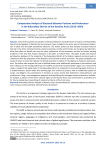
Статья научная
The article examines the specifics of electoral behavior and preferences of voters in the Kalevalskiy District of the Republic of Karelia from the moment it was included in the Arctic zone of the Russian Federation in 2015 until the 2024 presidential elections. The author points out that, despite increased research interest in the Arctic national territory, electoral practices and the will of voters are not given due attention, while they allow to identify not only the value preferences of the electorate, but also to localize existing problems in the area that require measures to be taken to resolve them. The paper studies the election participation behavior of the residents of the Kalevalskiy District at the federal, regional and local levels in comparison with the population of the Republic of Karelia and its Arctic territories. The paper establishes the values of voter turnout, the indicator of protest potential in relation to the degree of elections’ alternativeness. The author also analyzes the role of political powers that traditionally participate in the elections and their influence on the voting preferences of residents of the Arctic Karelian border region. As a result of the study, a model of the typical voter in the Kalevalskiy District is created (in terms of demographic structure, it is predominantly a person older than working age, not inclined to protest, with an established system of values, and diligent civic participation in elections at various levels) that determines voting behavior and preferences. Using a neo-endogenous approach and identifying the cleavages structures based on multifactor analysis, a pattern of the Arctic national region of the Russian Arctic was constructed as a possible case for future comparative researching of national territories of the Arctic zone.
Бесплатно
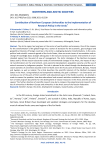
Статья научная
The Arctic region has long been at the center of world politics and economy. One of the reasons for the transformation of the global fringe into a center of attraction for the economic, geo-ecological and geopolitical interests of foreign countries is the Arctic is undergoing dynamic transformations. In the socio-political and scientific research agenda of the Arctic States, there are acute issues of accumulation and exchange of knowledge about changes taking place in the natural and socio-economic environment of a non-standard region from the point of view of management. The Arctic strategies of the Northern European States seek to fill the vacuum about the trends of environmental changes in the Arctic, the impact of natural transformations on the environment, socio-economic development, population security, and the use of natural resources by indigenous peoples. This task is planned to be solved through the development of research activities of universities located in the Far North and in the Arctic zone of Denmark, Norway, Finland and Sweden, as well as Iceland. The article describes the scientific interests of the Northern European States in the Arctic. Using analytical and comparative methods, the goal is achieved - to characterize universities as one of the parts of their scientific and educational space in the Nordic countries. An attempt is made to answer the question: how does educational and research activities contribute to the implementation of state program documents for the development of natural resources in the Arctic and the use of its spaces? The further direction of scientific research may be to compare the educational and research activities of universities in Northern Europe and universities in the Arctic zone of the Russian Federation.
Бесплатно
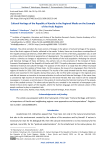
Статья научная
The article considers the main vectors of changes in the sphere of cultural heritage of the population of the Arctic regions of Karelia, reflected in the media. To date, there are six northern municipalities of the republic among such districts, which differ from each other in terms of territory, population size, as well as ethno-cultural and historical peculiarities of development. The assignment to the Arctic zone is considered as a stimulus to changes or adjustments in the identity of the local population. Analyzing the cultural and historical heritage of these territories, the authors rely on the provisions of the Concept of Socio- Economic Development of the Republic of Karelia until 2022. This policy document contains the main tasks related to historical and cultural heritage. The purpose of the article is to study how the official municipal newspapers cover the solution of these tasks. For this purpose, the issues of six newspapers from the Arctic regions of Karelia for 2021–2022 were analyzed. The results of the study showed that the Arctic programs, which were launched in the republic during these years, did not find wide coverage in the regional press and did not become an incentive to increase attention to cultural and historical heritage. At the same time, a consistently high volume of materials devoted to the Great Patriotic War was noted in all the analyzed newspapers. It occupies a central place in the system of constructing the historical memory of the population of the studied territory. The ethno-cultural specifics are revealed in the materials of newspapers published in those Arctic regions of the republic, where the Karelian language and the national culture of this people continue to play an important role.
Бесплатно
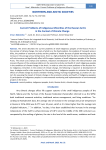
Current Problems of Indigenous Minorities of the Russian Arctic in the Context of Climate Change
Статья научная
The article describes the current problems of small indigenous peoples of the Russian Arctic in the context of climate change, the main of which are: the food problem, the problem of transport accessibility, the problem of economic activity and the problem of health. Because of global warming due to the increase in the average annual temperature, there is a high probability that the above-mentioned problems will only increase and significantly affect all life support systems of small indigenous peoples of the Russian Arctic. The article uses analysis and synthesis, induction and deduction to show the interconnection and mutual influence of the existing problems on the economic activity and health of small indigenous peoples in the conditions of climate change in the Arctic. In order to solve the current problems of the Russian Arctic indigenous minorities in the context of climate change, the following is required: 1) development of laws, strategies and/or state programs for the protection of indigenous peoples to minimize the adverse effects of climate change by sectors (reindeer herding, fishing, hunting and gathering); 2) creation of a system for assessing the impact of climate change on the economic activity and health of indigenous peoples; 3) participation of indigenous peoples in environmental monitoring and implementation of environmental projects in the Arctic.
Бесплатно
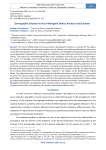
Demographic Situation in the Arkhangelsk Oblast: Analysis and Solutions
Статья научная
The issue of differentiation of socio-economic development indicators is relevant for the regions of the Russian Federation. An important condition for the effective and stable development of territories is a favorable demographic situation. This requires a competent and thoughtful demographic policy that will ensure population reproduction and economic development of the constituent entities of the Russian Federation. The study area is the Arkhangelsk Oblast, partly included in the Arctic zone of the Russian Federation, which is of strategic interest to Russia due to its geopolitical, geo-economic position in the modern world. The aim of the work is to analyze the changes in the qualitative and quantitative composition of the population of the Arkhangelsk Oblast, determined by the processes of fertility, mortality, migration, as well as the socio-economic situation and state policy. To analyze the demographic situation, the paper uses traditional methods of analysis (comparison, relative and average values, graphic method). The paper presents the territorial differentiation of the demographic situation in the regions of the Northwestern Federal Okrug. The information base is national and regional statistical information for the last 10 years. The article discusses the interim results of the implementation of the national project “Demography” in the Arkhangelsk Oblast. The results of the study can be useful for state authorities and local governments that manage the regional development of territories within the framework of the national project “Demography”.
Бесплатно
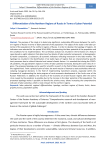
Differentiation of the Northern Regions of Russia in Terms of Labor Potential
Статья научная
The purpose of the study is to determine significant, sustainable differences between the northern regions of Russia in terms of labor potential of the population. The object of the study is the labor potential of the population of the northern regions of Russia. In order to develop the typology of regions, 22 indicators were selected for the period 2014–2020, characterizing the labor potential of the population and the conditions for its implementation. The correlation analysis has resulted in the formation of a feature space based on eight indicators that determine four blocks of labor potential components: a) demographic, b) health component, c) education, d) economic indicators reflecting interaction in the labor market. The typology has resulted in the identification of six stable types of regions that are characterized by specific inert processes due to cultural-historical and natural-climatic factors. It is revealed that during the COVID-19 pandemic, the gap between regions in terms of labor potential increased, leaving the same ratio of regions. The proposed typology can be used for scientific research in the field of labor potential management the regional level. From a practical point of view, the work may be of interest to state authorities when developing managerial decisions in the field of implementing investment projects, especially within the framework of implementing the state program of socio-economic development of the Arctic zone of the Russian Federation. In addition, the recovery of the economy of certain Russian regions after the severe crisis caused by the pandemic is possible due to the increase in the labor potential of the population. The presented typology makes it possible to identify the priority areas, allows increasing the comprehensive indicator of labor potential, which is most relevant for the northern regions.
Бесплатно
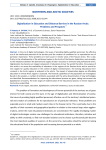
Digitalization in education and distance barriers in the Russian Arctic: problems and prospects
Статья научная
In the era of digital technologies, the issues of providing highly qualified personnel, the effective use of the intellectual potential of the territory and the creation of conditions for its reproduction are of particular importance. These problems are more acute in remote areas of the Russian Arctic. This is due, firstly, to the ultradispersity of the settlement system in the Arctic of the Russian Federation, and, secondly, to the imbalance between the demand and supply of labor resources in territorial and professional terms. Digitalization has become an integral component of education all over the world; therefore, the purpose of this article is to assess the availability of education in the regions of the Russian Arctic and to search for new targets for quality education in the context of digital transformation. The existing educational environment in the Arctic regions is analyzed in the article. The impact of urbanization degree on affordable education in remote Arctic regions is assessed. The financial capabilities of the population are investigated. Based on the analysis, a number of problems associated with the active dissemination of new technologies are identified. Recommendations for improving the educational process are given, taking into account the digitalization of society. The main stages of modernization of the educational process in remote regions of the Arctic are identified.
Бесплатно
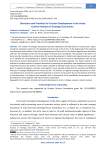
Статья
The number of strategic documents has been adopted at the federal level in recent years, establishing the regulatory regime for the development of tourism in the Arctic. At the beginning of the study the key directions and priorities of the tourist development of the Arctic on the federal agenda were identified, and then the strategies of the nine Arctic regions of Russia were considered. The purpose of the work is to determine the key directions and priorities for tourism development in federal and regional policies, as well as to identify the correspondence of regional strategic directions for tourism development with the key directions of tourism development in the Arctic declared by the federal agenda. The study is based on the method of content analysis of regional documents by assessing the qualitative and quantitative presence of keywords chosen by the authors, which made it possible to identify trends that are reflected to varying degrees in regional strategies, concepts, and programs. It was possible to demonstrate common and different features in strategic development of Arctic tourism. The analysis of regional strategic documents on tourism development reveals the existing heterogeneity in content and structure due to the diversity of formats of the documents. The analysis also revealed a lack of assessment of the possibilities and prospects for the development of interregional and intermunicipal cooperation.
Бесплатно

